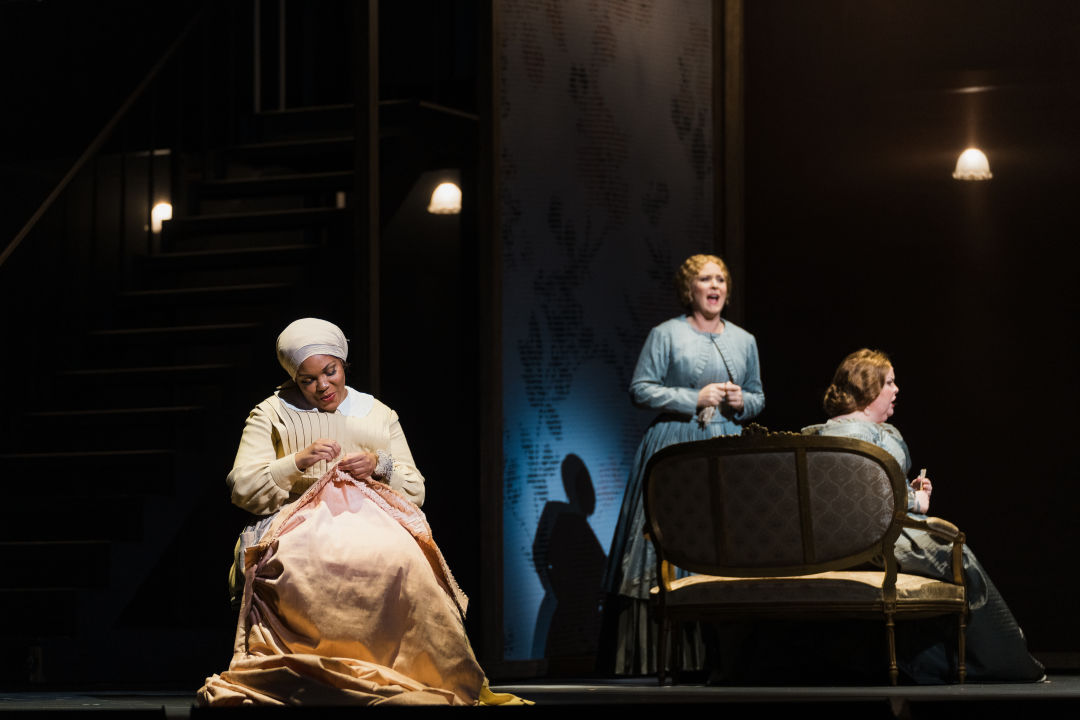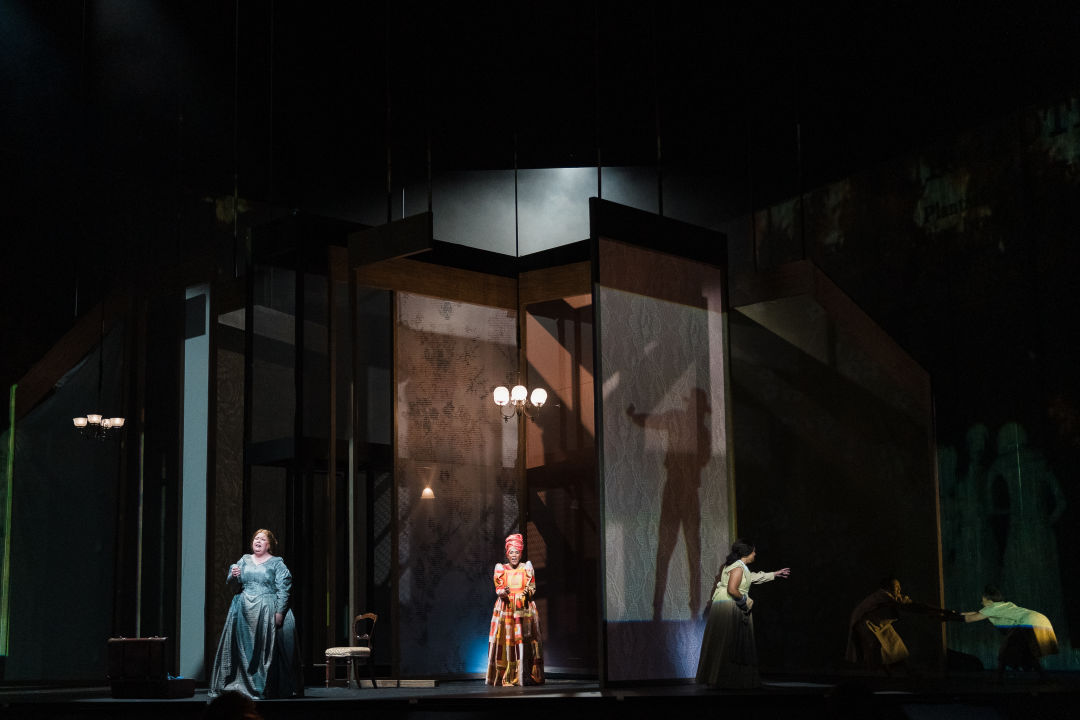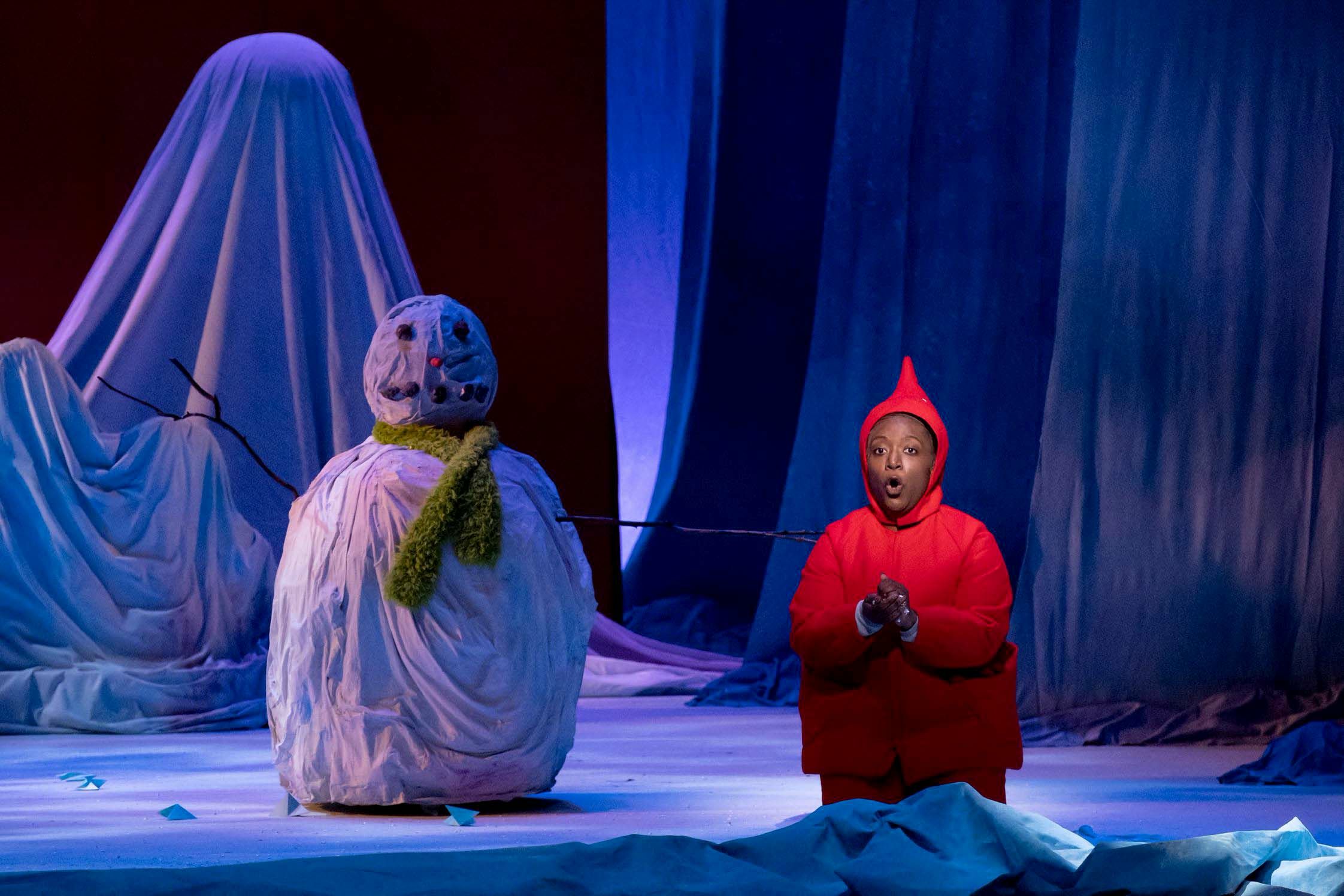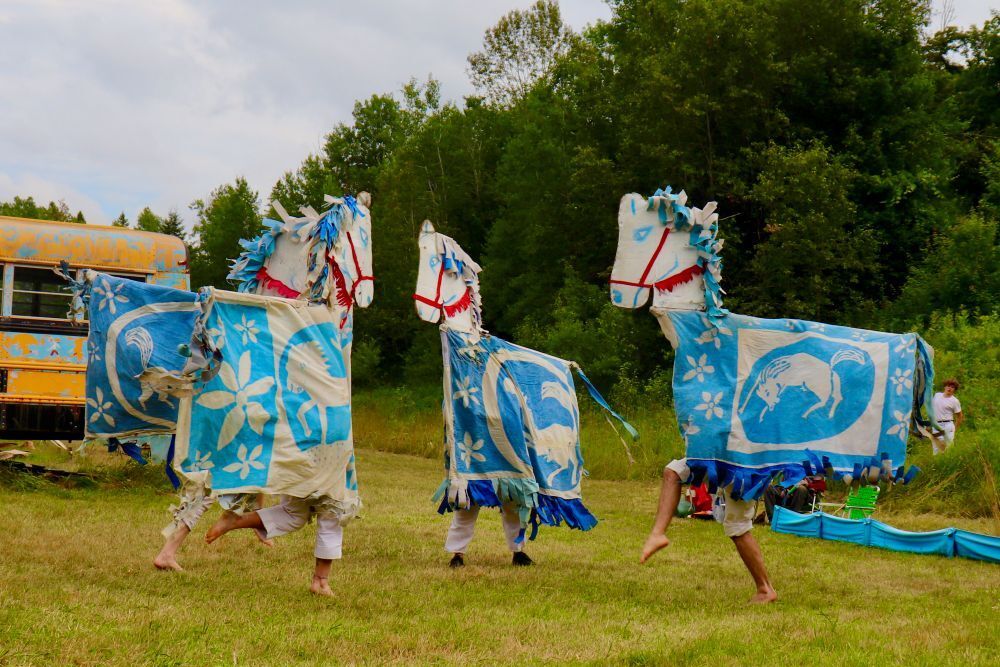Houston Grand Opera’s Intelligence Shows the Power of New Works

J’Nai Bridges and Janai Brugger (standing in middle, from left) join dancers from Urban Bush Women in Intelligence at Houston Grand Opera.
Image: Courtesy Michael Bishop
Opening night for Houston Grand Opera’s 2023–2024 season, October 20, marks a couple of exciting milestones for the company. The season’s opening production, Intelligence, by composer Jake Heggie with a libretto by Gene Scheer, is the opera’s 75th world premiere. What's more, the company is kicking things off with a world premiere for the first time in its history.
Doing so this year was by design, says HGO general director and CEO Khori Dastoor, who joined the company in January 2022. “One of the first things I did coming to HGO was to make Intelligence the opening of the season,” she says. “To take the opportunity to mark with pride the 75th world premiere of Houston Grand Opera. To talk about Intelligence in conversation with the entire field. And to shine a light on the fact that we are proud of it.”
HGO has a long track record of creating and supporting new works that not only showcase the evolution of opera, but also introduce the art form to new audiences. Since its founding in 1955, it’s mounted some of modern opera’s most lauded world premieres, which were later performed around the globe. Nixon in China (1987), composer John Adams’s first opera? That was HGO. Florencia en el Amazonas (1996), the first opera in Spanish to be commissioned by a major opera company? That was HGO. So were The Little Prince (2003), Little Women (1998), and 70 others, dating back to Thomas Pasatieri’s The Seagull in 1974.
“It’s a community that embraces topics and is willing to take things on without fear, which I really appreciate,” says Heggie, the Intelligence composer whose association with HGO goes back to 2003, when he was commissioned to write The End of the Affair, another HGO world premiere. Heggie’s operas Three Decembers (2008) and It’s a Wonderful Life (2016) also made their debuts at HGO. “This company has always looked for projects that will reach different communities,” he continues. “I feel safe here, creating. I feel welcomed. I feel like we can try things.”
Intelligence tells the story of Elizabeth Van Lew, a wealthy white woman from a prominent Southern family. During the Civil War, she and her enslaved servant, Mary Jane Bowser, ran a Union spy ring from the Van Lew plantation in Virginia. It’s based on a true story.

Mezzo-soprano J’Nai Bridges and members of the New York–based dance company Urban Bush Women perform in Intelligence.
Image: Courtesy Michael Bishop
“This docent at the Smithsonian, eight years ago, said to me, ‘Have you ever heard of the story of Elizabeth Van Lew and Mary Jane Bowser? They were spies for the North, living in Richmond.’” Heggie recalls. “I said no. And he said, ‘Well, look them up. That should be your next opera.’ And he walked away.”
Heggie’s interest was piqued. As he explored the story more deeply, he realized it was exactly right for an opera.
“It’s a very human journey, first and foremost,” he explains. “And it was taking on issues that are very, very resonant today, issues of power struggles, of race, how we deal with those issues in this country and in the world.”
As the nation struggles to talk about race and determines how to teach the darker elements of its past, individuals and organizations are searching for ways to confront these issues. Opera is no exception. Long seen as a bastion for the works of dead, white, male composers, the art form has been called out for its lack of diversity, both in storytelling and in those onstage telling the stories. For every Florencia en el Amazonas, there’s a cringey Turandot, with its stereotypical presentations of Asian people and women in power. And while the opera world has been having discussions on how to move the needle on this for decades, HGO has been putting in the work.

Janai Brugger (from left), Caitlin Lynch, and Jamie Barton share the stage in Intelligence, a new work by Houston Grand Opera.
Image: Courtesy Michael Bishop
Consider its 2010 world premiere of Cruzar la Cara de la Luna (To Cross the Face of the Moon), the first-ever mariachi opera. Since then, the Leonard Foglia and José “Pepe” Martinez composition has been performed across the country and around the world. Or last season’s tour de force performance by Black soprano Angel Blue as Violetta in La Traviata. HGO also invited a young Denyce Graves to be part of its acclaimed Houston Grand Opera Studio in 1988. She stayed for two years, departing in 1990; five years after that, the Black mezzo-soprano made her Metropolitan Opera debut.
Mezzo-soprano and HGO Studio alumna Jamie Barton, who sings the role of Elizabeth, is excited for this premiere of Intelligence.
“In opera, women so often have been relegated to the muse, the love interest, the beauty, those sorts of things,” she says. “In this one, not only are both of the women, Elizabeth Van Lew and Mary Jane Bowser, absolutely, by definition, heroes, they are strong.”
Barton has been outspoken about the need for representation in opera, whether it’s rethinking heterosexual love stories to be queer ones or pushing to see more artists of color onstage. Long a champion of new works herself, she loves exploring the multifaceted sides of her character Elizabeth, a woman who obviously believed in the Union’s side of the war, even as she was also clearly a product of her time and the Confederacy.
“It’s complicated, it’s nuanced, it’s not black and white by any stretch of the imagination,” Barton says.
Appearing alongside Barton as Mary Jane Bowser is soprano Janai Brugger, who is creating a role for the first time. She finds the prospect exciting and relishes the artistic freedom she’s been afforded to bring Mary Jane to life.
“I’ve been very fortunate to play women who are strong,” Brugger says. “And Mary Jane is definitely one of those resilient characters. She was very smart, and she put herself in very dangerous situations, some where she could’ve been killed. It’s exhilarating, and also a huge honor and a huge responsibility to tell her story.”

Intelligence tells the story of a Union spy ring in the South during the Civil War.
Image: Courtesy Michael Bishop
It’s a story told not only with music and voice, but also through dance. Director and choreographer Jawole Willa Jo Zollar, making her HGO debut, is founder of the Urban Bush Women performance ensemble; eight of those artists are onstage in Intelligence.
“Jake [Heggie] and I both have the same attraction to things that terrify us because when they terrify us, it’s like, 'Oh, OK, there’s something here for me to discover,'” Zollar says.
She got involved with Intelligence when Heggie emailed her, asking if she’d be interested. She considered saying no, until a friend convinced her it would be a great project. And she’s been excited to use choreography to propel the story forward. But audiences who may be used to more balletic moves in opera are hereby warned: this is not that.
“We’re visceral, we’re physical, we’re earthy,” Zollar says, “as well as airborne.”
“I’ve never seen anything like this in my life,” says Heggie. “In all my life of going to the theater and to the opera, I’ve never experienced anything like this. It is stunning and jaw-dropping.”
And that is exactly the feeling HGO hopes audiences have with Intelligence. CEO and general director Dastoor notes the show is the third-highest single-ticket seller of the year, behind Madame Butterfly and The Sound of Music. She feels Houston audiences are hungry to see themselves and their stories told on stage, ready to be witness to new works.
“Everything was once a new work,” she says. “Don Giovanni was being written the day it premiered. Butterfly was a catastrophe on opening night. The form is not a museum piece. Opera is living and breathing and changing all the time.”




